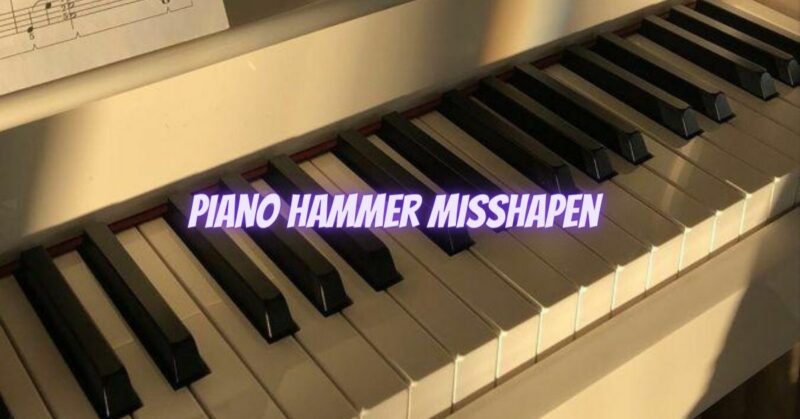The piano hammer is a critical component responsible for producing sound when it strikes the strings. However, over time, hammers can become misshapen due to wear and tear, humidity changes, or improper maintenance. A misshapen hammer can adversely affect the piano’s tone and playability. In this article, we will explore the causes, effects, and solutions for dealing with misshapen piano hammers.
Causes of Misshapen Piano Hammers:
- Normal Wear and Tear: Regular use of the piano leads to natural wear of the hammer felt. The felt becomes compressed and grooved, resulting in a misshapen hammer that may no longer produce the desired tone.
- Environmental Factors: Fluctuations in humidity levels can cause the hammer felt to expand and contract, leading to changes in its shape. High humidity can make the felt swell, while low humidity can cause it to shrink, both of which can affect the hammer’s shape.
- Poor Regulation: Improper hammer regulation, such as incorrect alignment or incorrect voicing, can cause the felt to wear unevenly and eventually become misshapen.
Effects of Misshapen Piano Hammers:
- Uneven Tone: Misshapen hammers may produce an uneven tone, resulting in some notes sounding brighter or duller than others.
- Inconsistent Playability: Misshapen hammers can lead to variations in the touch and feel of the keys, affecting the piano’s responsiveness and making it challenging for the pianist to control the sound.
- Reduced Dynamic Range: A misshapen hammer may not be able to generate the full range of dynamics, limiting the piano’s ability to produce soft and loud tones.
Solutions for Dealing with Misshapen Piano Hammers:
- Hammer Voicing: Voicing is the process of shaping and needling the hammer felt to achieve a consistent and even tone. A skilled piano technician can carefully voice the hammers to restore their proper shape and improve tone quality.
- Felt Replacement: If the hammer felt is severely worn or misshapen, it may need replacement. The technician will replace the felt with new, properly shaped ones to restore the hammer’s original form.
- Humidity Control: Maintaining proper humidity levels in the piano’s environment is crucial to prevent extreme expansions or contractions of the hammer felt. Using a humidity control system or a dehumidifier in humid climates can help protect the piano’s hammers.
- Regular Piano Maintenance: Regularly scheduling maintenance and tuning sessions with a qualified piano technician can prevent issues with the hammers and other components, ensuring the piano remains in optimal condition.
Conclusion:
Misshapen piano hammers can significantly impact the instrument’s sound and playability. Whether due to wear and tear, environmental factors, or poor regulation, addressing the issue promptly is essential to maintain the piano’s performance quality. Seeking the expertise of a qualified piano technician for voicing, felt replacement, and overall maintenance is crucial for preserving the piano’s tone and ensuring a satisfying playing experience. With proper care and attention, a piano’s hammers can continue producing beautiful, resonant tones for many years to come.


